I was honoured to officially open this new refuge facility in Dublin City which will provide a vital sanctuary for vulnerable women and children, offering safety and care in times of great need. This building is not simply a place to provide refuge but offers families access to a range of supports to help them recover and rebuild their lives. The refuge was funded by Cuan and will be operated by the Sonas Domestic Violence Charity.
I was honoured to officially open this new refuge facility in Dublin City.
Minister Jim O’Callaghan launches 2025 awareness campaign targeting misuse of illegal fireworks
24 September 2025
- Nationwide awareness-raising campaign to warn against serious risks posed by illegal fireworks
- Fines up to €10,000 and 5-years’ imprisonment applying for having fireworks in possession with intent to sell or supply, or if convicted or throwing an ignited firework at a person or property
- Campaign launched in collaboration with An Garda Síochána, the Irish Society for Prevention of Cruelty to Animals (ISPCA), Irish Guide Dogs, and Dublin Fire Brigade
Minister for Justice, Home Affairs and Migration Jim O’Callaghan today launched a nationwide awareness raising campaign to warn against the serious dangers posed by illegal fireworks and the strict penalties for their misuse.
The campaign was launched in collaboration with An Garda Síochána, the Irish Society for Prevention of Cruelty to Animals (ISPCA), the Irish Guide Dogs, and Dublin Fire Brigade at the Dublin Fire Brigade Training Centre in Marino. Representatives from the National Office for Community Safety were also in attendance.
The Department of Justice, Home Affairs and Migration plays a significant role through its annual Fireworks Awareness Raising Campaign in informing the public about the risk from illegal fireworks, their harmful effects on many in our communities, and the rules surrounding their use.
The campaign emphasises and demonstrates the physical danger and emotional distress caused by illegal fireworks in our communities, the use of which can attract fines of up to €10,000 and 5 years’ imprisonment if you have fireworks in your possession with intent to sell or supply, or if you are convicted of throwing an ignited firework at a person or property.
Speaking at the launch, Minister Jim O’Callaghan said:
“While Halloween can be an enjoyable time for our communities, we also know the distress the use of illegal fireworks can cause around this time of year.
“Often people who buy and use illegal fireworks don’t fully consider the harmful effect they can have in their local areas and on their neighbours. We also know they pose a real risk to the health and safety of young people, the elderly and the vulnerable. They also terrify family pets, service dogs and other animals.
“This campaign – and the penalties people face for misusing fireworks – show how seriously we take this kind of behaviour. I am urging people to think hard before they use fireworks this year. I am asking people to consider those who are indirectly impacted by their actions over the Halloween period.”
Minister O’Callaghan also praised the contribution of the ISPCA, Irish Guide Dogs, Dublin Fire Brigade, and An Garda Síochána to the campaign.
Greg O’Dwyer, Assistant Chief Fire Officer of Dublin Fire Brigade warned of the devastating physical injuries fireworks can cause and urged people to only attend officially organised fireworks displays this Halloween. He said:
“Dublin Fire Brigade Firefighters and Paramedics have had to deal with some horrific injuries caused by illegal fireworks over the years. These injuries can occur by fireworks going off in some young person’s pocket, severely burning their leg, or exploding in their hands, causing disfigurement to their fingers, or even as projectiles from bonfires, striking them in the face, and causing serious facial and eye injuries. These types of injuries are all potentially life-changing, or even worse.
“Fortunately, we have seen a decline in these types of injuries over the last few years, due mainly to the increase in the number of officially organised firework events, which provide a fun and safe environment. We would urge all parents and young people to check their local authorities’ websites, social media and local community groups, to find these events so everyone can be safe and stay safe around the Halloween period.”
Tim O’Mahony, Chief Executive Officer of Irish Guide Dogs, highlighted the dangers Halloween poses for Guide and Assistance Dogs and their owners:
“Halloween can be a very nervous and unsettling time for the owners of Guide and Assistance Dogs. While our dogs are highly trained to cope with stress, the anxiety caused by fireworks is beyond what any dog can reasonably endure.
“Each year, our clients report concerns weeks before 31 October and often take extra precautions – such as avoiding outings after dark – forcing them to alter their normal routines.
“Our trainers frequently need to work with dogs to counter the effects of fireworks. In some cases, despite every effort, the trauma is too great, and the dog must be withdrawn. The owner then faces a profound loss of independence and mobility while waiting through a lengthy process to be matched with another suitable dog.”
This was echoed by ISPCA Chief Inspector Conor Dowling, who said:
“Halloween has been an occasion of celebration in Ireland since ancient times, but for animals it can be frightening and dangerous, often due to the use of illegal fireworks.
“The senses of smell and hearing are far more sensitive in most animals than in humans and they can hear at different frequencies to us. The strange sight, sound and smell of fireworks can be extremely distressing for them.
“The ISPCA is urging the public to consider the distress and the dangers that fireworks cause, not just to domestic pets but also to livestock and to wildlife. Pet owners can follow our website tips and advice on how to ensure their furry friends feel safe and secure, and to keep all animals safe this Halloween.
“In addition to the awareness raising work in the run up to Halloween, additional efforts are made by An Garda Síochána to combat the illegal importation, sale and use of fireworks, which is known as Operation Tombola.
Operation Tombola combats the importation, sale and distribution of illegal fireworks, through intelligence led operations, visits to local car boot sales, searches and seizures of fireworks, as well as focusing on preventing associated public disorder and anti-social behaviour through the incremental deployment of resources.”
Speaking at today’s launch, Inspector Ciaran Nunan of the Garda National Community Engagement Bureau said:
“Halloween is a family occasion full of excitement and fun for young and old. We are appealing to parents and guardians, particularly those with young children, to be aware of the serious danger of fireworks and the nuisance they cause to communities.
“Fireworks are illegal, and young people especially need to be fully aware that it is a criminal offence to throw or direct any ignited firework at a person or property. Over the coming weeks, Community Policing Gardaí will be visiting schools to speak with children about the dangers and criminal offences associated with fireworks.
“An Garda Síochána will be proactively targeting the supply of illegal or unlicensed fireworks under our national operation, ‘Operation Tombola.’ Illegal fireworks are seized so as to prevent anti-social behaviour and dangerous incidents including possible injury and we will prosecute those responsible.
“If you have information relating to the sale or supply illegal or unlicensed fireworks, please contact your local Garda Station or speak with us on the Garda Confidential Line on 1800 666 111. Doing so might prevent serious injury to a young child this year.”
Minister Jim O’Callaghan concluded by urging anyone tempted to use fireworks this Halloween to consider the consequences their actions may have on themselves and the wider community. He said:
“We hear far too often of young people who have suffered injuries because of fireworks. These incidents put our emergency services and frontline workers under enormous extra pressure at this time of year, which puts everybody at risk.”
The Government today accepted my recommendation to appoint Justin Kelly as the next Commissioner of An Garda Síochána following an open competition conducted by public jobs.
I am very pleased that the Government today accepted my recommendation to appoint Justin Kelly as the next Commissioner of An Garda Síochána following an open competition conducted by public jobs.
Justin Kelly is currently serving as Deputy Commissioner Security, Strategy and Governance and he will take up the Commissioner role on September 1st.
The role of Garda Commissioner is one of the most challenging and impactful leadership positions in Ireland’s public service and the appointment process was suitably rigorous. Justin Kelly is both qualified and particularly well suited to the role of Commissioner given his extensive leadership experience over the last 30 years in some of the most challenging issues facing An Garda Síochána including national security, domestic and sexual violence, and organised crime.
I know Justin is fully committed to providing a high visibility, highly trusted policing service to the public in keeping with the Garda mission of Keeping People Safe.
I also want to thank and pay tribute today to the outgoing Commissioner Drew Harris for his leadership and commitment over the last seven years.
Fresh approach to enhance community safety as Minister Jim O’Callaghan gives the green light for new Local Community Safety Partnerships nationwide

30 June 2025
- Regulations signed by Minister Jim O’Callaghan, which come into effect today, pave the way for new Local Community Safety Partnerships to begin their work across the country
- The Partnerships replace Joint Policing Committees and will serve as multi-agency community-led structures to address and improve safety in communities
- Delivers on key Programme for Government commitment
The Minister for Justice, Home Affairs and Migration Jim O’Callaghan has signed regulations, which come into effect today (Monday June 30th), that provide for the establishment of Local Community Safety Partnerships in each local authority area across the country.
At a local level, community safety partnerships will play a major role in enhancing community safety nationwide in collaboration with An Garda Síochána, local residents, businesses and state agencies.
The regulations set out how the Safety Partnerships will operate.
Minister Jim O’Callaghan said,
“I am very pleased to sign the regulations which means Local Community Safety Partnerships can now be established across the country. The regulations outline how they will operate in practice, transparently and efficiently, with each Partnership having a clear mandate and strong local engagement at its core. Local Community Safety Partnerships reflect a significant step towards a much more collaborative, responsive, and locally driven approach to community safety.”
A total of 36 Safety Partnerships in every local authority area will be established, with up to 30 members in each.
The Safety Partnerships will include a broader range of members than Joint Policing Committees (JPCs). Mandatory members will include local councillors, local authority officials, An Garda Síochána, representatives from the HSE and the Child and Family Agency Tusla.
Local residents, members representing youth groups, the older population, new and minority groups, business and education representatives will also be included.
Each LCSP can hold as many meetings as needed but they must hold at least six meetings annually. Members of the public must be allowed to attend one of those meetings while Oireachtas members and all locally elected public representatives will have opportunities to engage by attending at least one LCSP meeting.
Minister O’Callaghan continued,
“Community safety means local elected representatives, state agencies, community organisations and the public working together with An Garda Síochána to help make our communities safer and more connected.
“While Ireland is generally regarded as a safe country with relatively low crime rates, some communities may experience a different reality. We need the structures in place at a local level so longer-term solutions that are not focused solely on policing can be put in place. Public lighting, waste collection, public spaces, the location of services, can all contribute to feelings of safety in our towns.”
Each LCSP will be led by a voluntary chairperson and vice-chairperson, elected from the membership, and will be supported by a coordinator and an administrator role.
Each newly established LCSP will be required to develop and implement its own tailored community safety plan. The Partnerships will take a strategic approach to their work so that issues arising can be dealt with in a coordinated manner and addressed collectively by relevant service providers in partnership with the community.
Minister Jim O’Callaghan launches final implementation plan for Zero Tolerance Strategy on domestic, sexual and gender-based violence
· Priority areas include expanding refuge accommodation, advancing legislative reform, and cross-sectoral training initiatives for frontline professionals
· There are 95 actions in total across the strategy’s four pillars of protection, prevention, prosecution and policy co-ordination
· A robust monitoring and reporting framework establishes performance indicators to track progress and understand impact
24 June 2025
The Minister for Justice, Home Affairs and Migration, Jim O’Callaghan, has published a targeted implementation plan for the final phase of Zero Tolerance, the Third National Strategy on domestic, sexual and gender-based violence (DSGBV).
The implementation plan contains 95 actions across the strategy’s four pillars of Protection, Prevention, Prosecution and Policy Co-ordination, with a strong focus on delivery and collective action to 2026.
The DSGBV Agency Cuan worked in collaboration with officials from the Department of Justice and in close consultation with other Government Departments, state agencies and external stakeholders to develop the plan for 2025-2026.
Minister Jim O’Callaghan said:
“This final implementation plan for the Third National Strategy draws directly from insights gained through ongoing monitoring and progress reporting by Cuan. It provides a focused roadmap to deliver on the whole-of-government commitment to a zero-tolerance approach to DSGBV.
“This is a plan focused on delivery, accountability and ensuring that we continue the momentum and focus on this issue.
“I am committed to building on what has already been achieved, and to strengthening implementation and identifying the actions we need to take now and where we need to go next to prepare a clear pathway toward the Fourth National Strategy.”
Priority areas include continuing national leadership and cross government alignment, expanding refuge accommodation, delivering a comprehensive national emergency domestic violence accommodation plan, and advancing legislative reform. That legislative reform includes removing the guardianship rights of a person who has been convicted of killing their intimate partner; developing a mechanism to ensure any person in an intimate relationship can be informed if their partner has a history of domestic violence; and advancing provisions to ensure counselling records are only released where the Court decides that they contain material relevant to legal proceedings.
Minister O’Callaghan added:
“The government is delivering on the commitments in the Zero Tolerance Strategy to achieve a society where sexual violence, and the toxic attitudes that fuel it, are not accepted. Under the Strategy we’ve already introduced a range of legal reforms to help achieve this and other legislative measures that I am progressing will deliver a clear message that sexual abuse and sexual violence will not be tolerated, that survivors will be supported and perpetrators will be held accountable.”
The plan also includes actions to continue to deliver impactful awareness campaigns on sexual consent and pathways to safety, and a comprehensive set of training actions to upskill frontline professionals across the health and social care sector, DSGBV services, the judiciary, courts and other justice agencies.
The development of the plan was collaborative and evidence informed, involving research and a review of implementation to date, followed by in-depth consultations with Government departments and state agencies. It takes an intersectional approach, ensuring that actions and outcomes are responsive to the diverse and overlapping identities of victims and survivors of DSGBV, supported by the development and establishment of survivor-centred structures to ensure that victim/survivor voice is heard. The work to develop foundational structures, build networks and relationships lays the groundwork for beginning the transition to a Fourth National Strategy on DSGBV.
Dr Stephanie O’Keeffe, CEO of Cuan, said:
“This final phase shows how seriously we take implementation. The new framework gives us a clearer line of sight on what’s being delivered, what impact it’s having, and where greater focus is needed.
“However, this is not just about measuring activity – it’s also about assessing real impact, understanding the challenges in implementing a strategy with over 20 partner organisations and continuously improving our collective response. The inclusion of survivor perspectives is a key strength of this approach.”
Also published today is the second 2024 Progress Report, covering the period July to December 2024, which highlights continued progress across government and the sector in implementing the Zero Tolerance strategy.
Notable achievements during the reporting period include:
• Expanding emergency accommodation capacity including launch of a state-of-the-art refuge facility in Wexford and strengthening the pipeline for refuge and safe home expansion
• Reform of the Social, Personal and Health Education (SPHE) Curriculum to empower students to be healthy and resilient young adults who have the skills and confidence to nurture healthy relationships
• Expansion of services for children and young people experiencing domestic or sexual violence, with €17m in funding distributed to 60 services supporting children and young people
• Enactment of the Family Courts Act 2024 providing for the establishment of family court divisions within the existing court structures including a Family High Court, a Family Circuit Court and a Family District Court
• Supporting the Game Changer campaign, a three-year initiative led by Ruhama, in partnership with the GAA and the Men’s Development Network, using sports-based advocacy to raise awareness of gender-based violence.
• Convening of a National Consent Forum
• Engagement with the Central Statistics Office (CSO) to scope the development of a Domestic Violence survey to commence in 2025.
The 2025–2026 implementation plan and the Second Progress Report (2024) are available at:
https://assets.gov.ie/static/documents/Zero_Tolerance_Implementation_Plan_2025-2026.pdf
Minister Jim O’Callaghan receives Cabinet approval to strengthen Ireland’s counter-terrorism laws with the publication of the
The Minister for Justice, Home Affairs and Migration Jim O’Callaghan today received cabinet approval to publish the Criminal Justice (Terrorist Offences) (Amendment) Bill 2025 to strengthen Ireland’s counter-terrorism laws.
The Terrorist Offences Bill 2025 will allow for the prosecution of a broader range of terrorist activities in light of the evolving nature of terrorism.
These include terrorist acts with a cross-border element and cyber-attacks where the aim is to cause widespread harm.
This bill will bring Ireland’s counter-terrorism laws into line with those of other EU Member States. This alignment will facilitate Ireland’s participation in enhanced counter-terrorism networks across the EU, enabling An Garda Síochána to tap into those networks to respond to both domestic and cross-border terrorist threats.
Speaking following the cabinet meeting, Minister Jim O’Callaghan said:
“I am very pleased to receive cabinet approval to publish this important piece of legislation. It will strengthen Ireland’s laws by broadening the scope of prosecutable offences in respect of terrorist activity and marks a significant step forward in ensuring that Ireland’s counter-terrorism framework is robust and fit for purpose in the face of modern terrorist threats.
“The bill will criminalise three new terrorist offences targeting the foreign terrorist fighter phenomenon:
– receiving training for the purpose of terrorism;
– travelling for the purpose of terrorism; and
– organising or facilitating travel for the purpose of terrorism.
“It also permits courts, when sentencing a person convicted of recruiting or providing training for terrorism, to treat as an aggravating factor that the offence was committed against a child.
“I am pleased to be progressing this legislation in line with the commitment contained in the Programme for Government.”
Minister O’Callaghan welcomes attestation of 120 new Gardaí

Further intake of Garda recruits will enter the Garda College next week, Minister for Justice, Home Affairs and Migration Jim O’Callaghan T.D. has welcomed the attestation of 120 new members of An Garda Síochána at an attestation ceremony in the Garda College in Templemore today.
The new Garda members will now be assigned by the Commissioner to Garda Divisions throughout the country where they will begin their careers in An Garda Síochána.
Speaking at the Garda College today, Minister O’Callaghan said:
“My focus is on ensuring Ireland is a safer place for everyone. Making sure that An Garda Siochana is at full-strength is a core part of that. This Government has made a commitment, and we will recruit at least 5,000 new Gardaí over the next five years.”
“I am pleased that a further 170 recruits will enter the Garda College this coming Monday 9th June.”
Of the 120 attesting today, 89 are men and 31 are women.
Minister O’Callaghan added:
“I want to congratulate our new Garda members as they attest from the Garda College and join their new stations across the country. 74 of the new Members will be deployed across the Dublin Metropolitan Region.
“For each new Garda attesting today, this is a milestone that marks the beginning of a fulfilling career dedicated to protecting the community and to public service.
“That strong relationship between our Gardaí and the community is not the norm in many countries and it is something we must never take for granted. I know that each one of these Gardaí will continue in this great tradition.
Law allowing naturalised Irish citizenship to be revoked in serious cases recommenced
The signing of this order reestablishes the important and necessary power, Justice Minister Jim O’Callaghan said.
LEGISLATION ALLOWING for naturalised Irish citizenship to be revoked in serious cases is to be recommenced, by order of Justice Minister Jim O’Callaghan.
The minister has the power to revoke Irish citizenship granted by naturalisation under Section 19 of the Irish Nationality and Citizenship Act 1956.
However, a Supreme Court judgment in 2021 found that the process lacked some necessary safeguards, resulting in necessary amendments having to be made to the law.
The minister has now signed the commencement order of that legislation, re-establishing the revocation process effective from 7 April 2025.
“The signing of this order reestablishes the important and necessary power to revoke naturalised Irish citizenship.
“Where citizenship has been obtained fraudulently or when an individual poses a serious risk or threat to the State, it is essential that the power to remove the citizenship which has been granted to them is there,” said the justice minister.
“The order is not designed to disadvantage or be punitive against naturalised Irish citizens. It does, however, provide repercussions and remedy when citizenship is acquired by fraudulent means, or when a person poses a serious threat to our society,” he added.
O’Callaghan added: “Revocation of Irish citizenship is only undertaken in the most serious of circumstances and I am aware that the loss of citizenship has serious consequences.”
The revocation of citizenship has been used sparingly in the past, fewer than 10 times since 1956, the Dáil was told last year. The revocation is only done “in the most serious of circumstances” including fraudulent acquisition of citizenship and terrorist activity, former Minister Helen McEntee said at the time.
UK-Ireland Summit
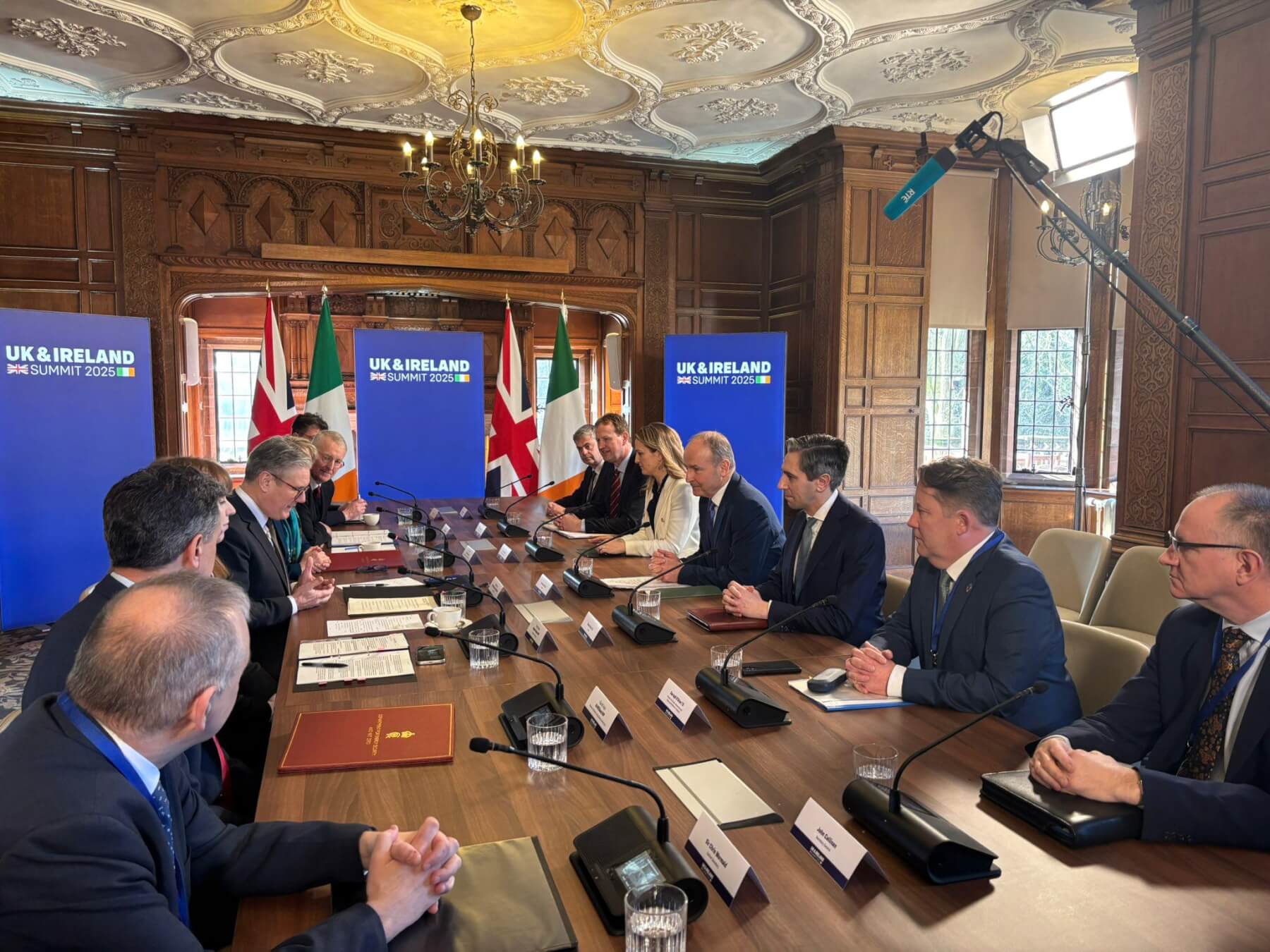
I am Looking forward to working together to enhance the relationship between our two countries
Delighted to meet the Secretary of State, Yvette Cooper this morning.
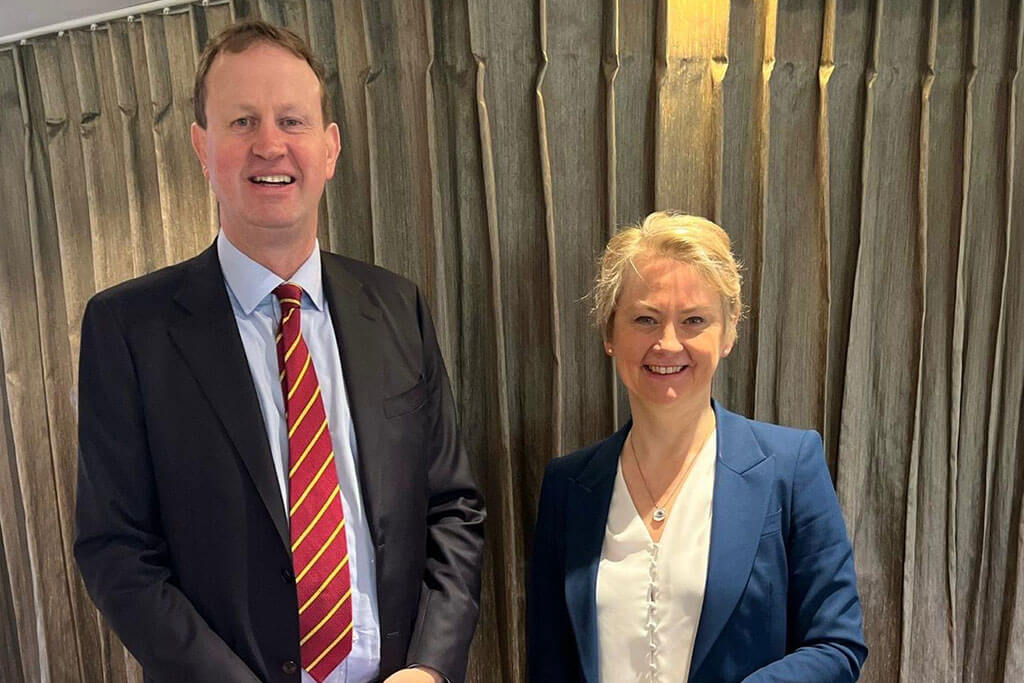
We discussed protecting the common travel area and ensuring our immigration laws are robust and enforced. Looking forward to working together to enhance the relationship between our two countries. UK-Ireland Summit.